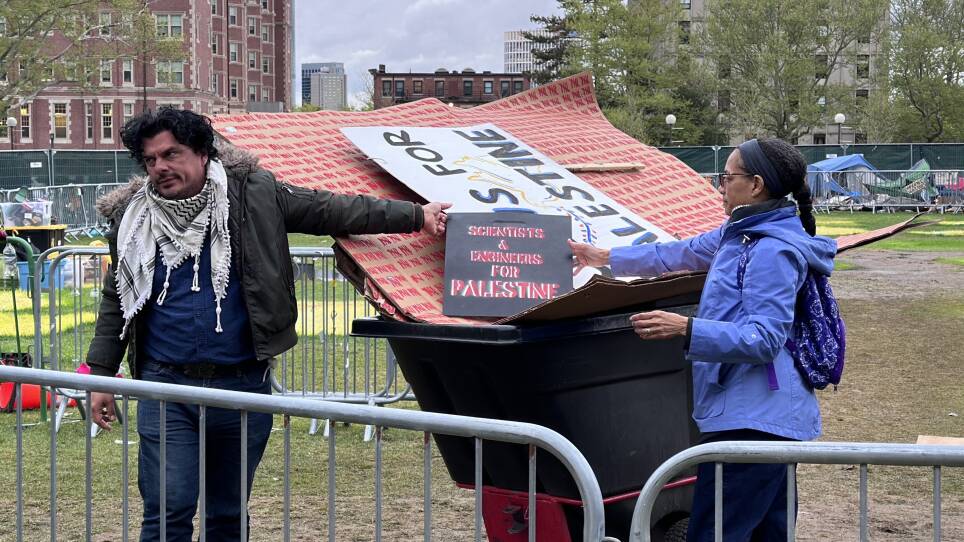MIT and State Police arrested 10 people protesting the university’s ties to Israel early Friday, removing students from an encampment that had been on campus since April 21.
“At my direction, very early this morning, the encampment on Kresge lawn was cleared,” MIT President Sally Kornbluth said in an open letter. “The individuals present in the encampment at the time were given four separate warnings, in person, that they should depart or face arrest. The 10 who remained did not resist arrest and were peacefully escorted from the encampment by MIT police officers and taken off campus for booking.”
MIT’s student protesters held a press conference Friday afternoon, less than 12 hours after the encampment was cleared, to make it clear that they see their fight as far from over, even though the tents are gone. They described their protest as one in a long tradition of anti-war demonstrations.
“History will remember today, and history will vindicate the students and workers who spoke truth to power, just as it has for the American invasion of Vietnam and MIT investment’s South African apartheid,” said Dan Zeno, an MIT graduate student who goes by Zeno.
Kornbluth has repeatedly cited the need to preserve faculty’s academic freedom to conduct research with Israel, in conflict with students’ demand that the university divest from its Israeli ties. But student organizers like Sam Ihns, also a graduate student, rejected that idea.
“To quote our predecessors during the 1968 protests on MIT’s campus, the principle that people should not kill other people is more important than notions of freedom to do any kind of research one might want to undertake,” he said.
Kornbluth called the early-morning Friday arrests a “last resort” — a characterization that Zeno disputed.
“How can it be a last resort? She could have not arrested us and continued to negotiate with us,” he said. “So I don't think it was a 'last resort,' it was just [that] they wanted to silence us.”
Dozens of students have received interim suspensions from the university for their participation in the nearly three-week demonstration.
Zeno said he was one of those students and that he, his wife, and 5-year-old daughter will need to find housing off campus by May 15. When asked what comes next for his family, he said packing was at the top of the list.
“You know, I have a kid — getting her room together, disassembling her bed,” Zeno replied. “And also just looking for transitional housing. ... We have a lot of support in our transition. It’s just unfortunate that we’re even in this situation in the first place.”
Organizers said they are still determined to hold MIT to account. The press conference rolled into a rally with hundreds of protesters, who often broke out into chants such as, “40,000 people dead and you’re evicting us instead.”
Hundreds of marchers then took to the streets and shut down traffic on their way to MIT's Gray House, Kornbluth’s official residence on Memorial Drive. The crowd chanted in front of the house and speakers addressed the crowd, including Austin Cole, a graduate student who says he’s been placed on interim suspension.
“In the letter that I was suspended, they said I was suspended for engaging in civil disobedience,” Cole said into a microphone. “Last year, Sally Kornbluth and MIT gave me an award for helping create and run a civil rights immersion trip — that studied civil disobedience.”
“So, we’re allowed to study civil disobedience. We’re allowed to go to Birmingham and Selma and Jackson and Atlanta and talk about all the civil disobedience and all the values that MIT claims to have. But then, when we engage in civil disobedience, we are suspended and brutalized,” he continued as the crowd jeered. “I would call Sally Kornbluth Bull Connor, but she doesn’t deserve the comparison,” Cole added.
As students dispersed, they chanted, “We’ll be back.”
Earlier on Friday morning, school workers were removing tables, tents and large signs with messages of support for Palestinian people, along with dozens of Israeli flags in the grass near the encampment.
“I have no illusions that today’s action will bring an end to the conflict here, as the war continues to rage in the Middle East,” Kornbluth wrote. “But I had no choice but to remove such a high-risk flashpoint at the very center of our campus.”
Campus protesters continued to call for MIT to stop research related to Israel's defense ministry. Officials estimate that the war between Israel and Hamas, which began Oct. 7, has claimed at least 34,500 Palestinian and 1,200 Israeli lives.
Mohamed, an MIT graduate worker who helped organize the encampment, said the protest has been peaceful. He called the university's response “embarrassing.”
“They had hundreds of riot gear officers, state troopers, all to come down for a student encampment that was peaceful throughout its time here,” he said.
He said students will continue advocating for a ceasefire, and for MIT to cut its research ties with Israeli defense.
“It's very clear that business cannot continue as usual for MIT,” he said. “Nobody really thinks that college students warrant hundreds of riot gear officers descending onto their campus at 4 a.m. in the morning in an ambush orchestrated by the administration.”












